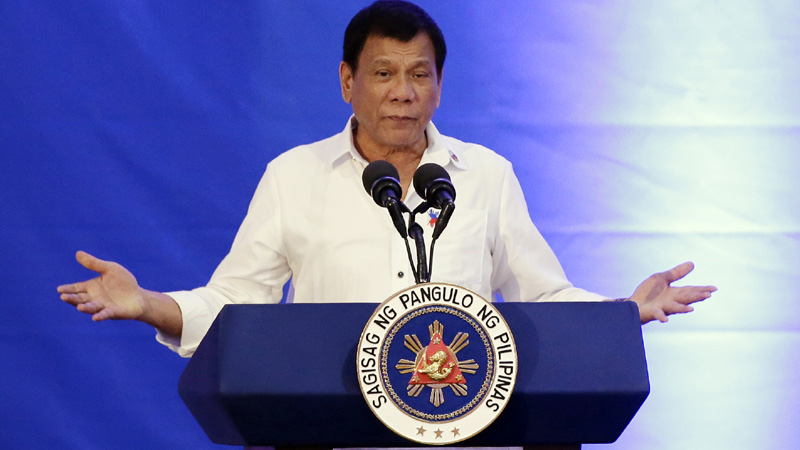President Rodrigo Duterte thinks he will get along with Donald Trump as US president and says he trusts Trump’s judgment to deal fairly with illegal immigrants he plans to kick out of the United States.
Mr. Duterte’s hostility toward the United States has defined his foreign policy so far, but he has changed his tune since Trump’s surprise election win last week.
In an interview with reporters in Malacañang on Tuesday night, Mr. Duterte acknowledged Trump’s intent to deport up to 3 million illegal immigrants.
“I trust in his judgment that he would be fair in the matter of the treatment of illegal immigrants,” Mr. Duterte said.
“I cannot talk for the illegals because, whether President Trump or anybody else for that matter, an illegal is always an illegal,” he said.
Playing down impact
Administration officials are playing down the likely impact of a mass deportation of Filipinos from the United States.
Labor Secretary Silvestre Bello III on Tuesday said only a few Filipinos were working illegally in the United States, while presidential spokesperson Ernesto Abella on Wednesday said Trump’s immigration policy would have little impact on the Philippines.
Both officials, however, did not give an estimate of the number of Filipinos working illegally in the United States.
Inquirer research showed 3.5 million Filipinos were living in the United States as of 2013, the year for which latest figures were available. Of those, 271,000 were illegals.
Remittances
Bello said the illegals could look to the government for help, but a crackdown could severely strain government logistics and emergency livelihood and job programs.
The expulsion of the illegals could also punch a hole, though maybe not too big, through a significant item in the Philippines’ economic basket—remittances from US-based Filipinos.
Inquirer research showed that last year, US-based Filipinos sent home $8.41 billion (P413.52 billion), equivalent to 3 percent of the Philippines’ $291.97-billion (P14.36-trillion) gross domestic product.
How much would be lost is hard to estimate, as the share of the illegals in the overall remittances from the United States is unknown.
Despite the economic disaster faced by the Filipino illegals in the United States, Mr. Duterte said he was sure he would get along with Trump, with whom he is often likened.
“We have no quarrel. I can always be a friend to anybody, especially to a president, a chief executive of another country. I am not being reprimanded for the campaign about human rights,” Mr. Duterte said.
Human rights is a red line topic for Mr. Duterte and a trigger for his rage.
The President has almost daily badmouthed US President Barack Obama, calling the American leader a “son of a bitch” and telling him to “go to hell” for expressing concern about extrajudicial killings in Mr. Duterte’s brutal campaign against illegal drugs.
Nearly 4,000 people have been killed by police and suspected vigilantes since Mr. Duterte launched the campaign upon taking office four months ago.
The United Nations and European Union have also expressed concern about those killings and the International Criminal Court has warned that Philippine officials could be prosecuted at the tribunal for crimes against humanity.
Mr. Duterte has responded to them with derision, directing his ire mostly at the United States, from which he has declared economic and military “separation” in October to give China a greater role in Philippine development.
But after Trump won the US presidential election on Nov. 8, Mr. Duterte softened his stance, saying he did not want to quarrel with the United States anymore because Trump—foulmouthed and with a volcanic temper like him—was already the “leader of the most powerful country in the world.”
Economic damage
If Trump follows through on some of his campaign promises, however, it could damage the Philippine economy.
His immigration policy is just one threat to the Philippine economy. His threat to tear up the United States’ economic alliances is another.
The United States may remain the most powerful country in the world under Trump, but Mr. Duterte cannot refer to him as the leader of the free world.
With Obama stepping down in January, analysts have begun to assign that role to German Chancellor Angela Merkel. —WITH WIRE REPORTS
